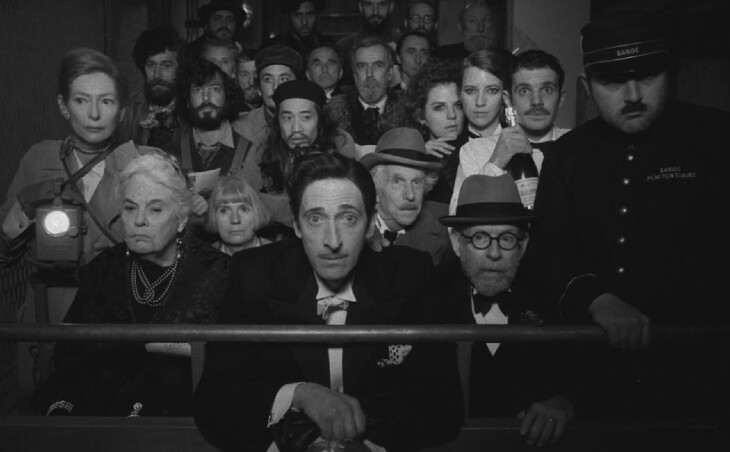There are filmmakers who know what to expect before they enter the cinema. Symmetrical frames, pastel styling, gallows humor and ironic distance – this is Wes Anderson. The French Dispatch, as befits a real work leader, makes 300% of the author’s standard.
Editorial
We are proud to present you the newest, and at the same time the last issue of “The French Dispatch”. In it – a selection of the best texts by our editors and correspondents. Herbsaint Sazerac (Owen Wilson), a flâneur-cyclist, will take you for a ride around Ennui-sur-Blasé, discovering your favorite, though perhaps a bit dark, nooks and crannies of our town. In the culture department: irreplaceable JKL Berensen (Tilda Swinton) will present the story of a valuable acquisition from Mrs. Clampette’s gallery – works by genius behind bars, Moses Rosenthaler (Benicio del Toro). Lucinda Krementz (Frances McDormand) reports from the very heart of the student protests led by Zeffirelli (Timothée Chalamet), and in the culinary addition Roebuck Wright (Jeffrey Wright) will taste the specialties of Lt. Nescaffier (Steve Park), a one-of-a-kind chef,
We would like to kindly inform you that due to the expiration of the title, our subscribers will receive adequate compensation for the numbers not received.
Source: lithub.com
A casket full of nostalgia
Anderson had long dreamed of his own collection of stories. The French Dispatch (the conscience clause prohibits the writer from using a caricatured title proposed by the Polish distributor), therefore, it seems to be a partial fulfillment of this whim – it is basically an anthological film, consisting of several etudes stylized for the texts collected between the covers of the last title number of the periodical – a foreign supplement to the local a newspaper published in a small town in Kansas. These articles do not connect with each other in terms of plots, but allow the director to highlight another fascination of his – the erudition of the cult weekly “The New Yorker”. Inspirations are visible to the naked eye – from a series of phenomenal posters, iconographically imitating the characteristic graphic design of the newspaper, through the language – stylized in the sophisticated, consciously pretentious English language of the New York intelligentsia, ending with the characters of the editors themselves – fictional, but combining in their structure the features of journalists shrouded in industry legend. These figures are made of phantasmagoria and nostalgia, evoking the myth of journalistic pietism – unwavering objectivity and linguistic perfection. Bill Murray, whose Arthur Howitzer Jr. It is not without reason to resemble the colorful founder of the New Yorker, Harold Ross. The protagonists of the texts, on the other hand, may be exaggerated, eccentric and detached from (and so, in the author’s style, completely artificial) reality, perhaps sketched in shortcuts, but both form and length stand in the way of psychological depth. The extensive range of personalities is compressed into half-hour-long etudes,
Source: elledecor.com
On autoanderson
Anderson made a truly cinematic film again – the director cites over several dozen titles here (which the persistent ones can go on a bloodless hunt and have fun tracking references). In formal terms, it is still the essence of the unmistakable style of the first Hollywood hipster, with a great deal of conventionality, overt unreal and total stylization of the presented world. The original characters are set in equally unconventional moments and circumstances, the macabre is served with lightness and stoic calm, the atmosphere is dominated by a deeply hidden melancholy of carefree play, although the satire’s edge does not seem to be aimed at any specific goal. Instead, charismatic actors spit out brilliant comments on all sorts of topics: cursory observations on the nature of youthful rebellion and the façade of immature idealism, life in exile, commercialization of art and, finally, journalistic impartiality. Expressive craftsmanship is used here primarily for dreamy weaving about people who are a bit sad, blasé, mannered, often broken and lost, but faithful to their workshop and ideals without exception.
The French Dispatch is a test of mindfulness and a test of mental fitness; the narrative rushes without looking back and not waiting for those who will catch breathlessness on the way. And although there is definitely more form than content (alternatively: there is more than enough thematically diverse content to be able to fully focus on it in one approach), it cannot be denied style and charm.
We invite you to watch the film in the Cinema City cinema network!
Nasza ocena: 8/10
Wes Anderson once again gives viewers everything you'd expect from a Wes Anderson movie. Skeptics will probably not be convinced, but fans of the director's fanciful imagination will leave the cinema satisfied.PLOT: 7/10
SOUND SETTING: 8/10
Characters: 7/10
VISUAL SETTING: 10/10

